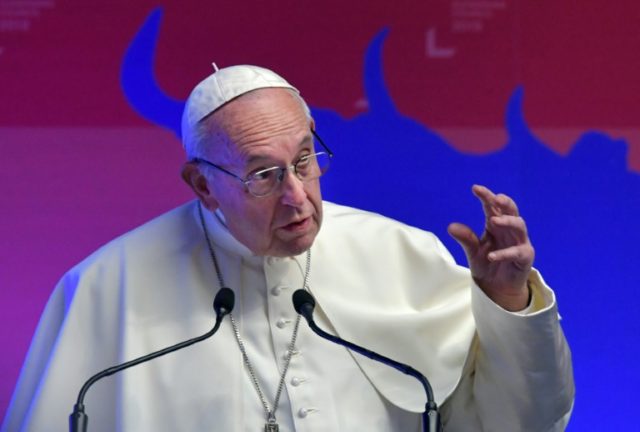Pope Francis had hard words for priests guilty of sex abuse Sunday, calling them “ravenous wolves” and “tools of Satan,” though critics said the pope basically repeated old promises that do not go far enough.
In delivering his concluding remarks for a four-day Vatican sex abuse summit, the pope said that although the sexual abuse of children is a universal problem in modern society, it is a “monstrosity” in the Church, because it clashes directly with the message of Christianity.
“The inhumanity of the phenomenon worldwide becomes even more serious and more scandalous in the Church, because it contrasts with its moral authority and its ethical credibility,” Francis said. “The consecrated person, chosen by God to guide souls to salvation, lets himself be overcome by his own human frailty, or by his own illness, thus becoming a tool of Satan.”
Despite months of debate regarding the deeper causes of clerical sex abuse, Francis side-stepped the question Sunday, saying there are “no sufficient explanations for these abuses against children” and suggesting that we are simply up against “the mystery of evil, which rages against the weakest because they are an image of Jesus.”
At the same time, the pope said that the sexual abuse of minors is “always the consequence of the abuse of power and the exploitation of the inferior position of the defenseless one who is abused.”
The Church “feels called to fight this evil that touches the center of her mission: to announce the Gospel to the little ones and to protect them from voracious wolves,” he said.
The pope also said that people’s “justified rage” over the phenomenon of clerical sex abuse is “the reflection of God’s wrath, betrayed and slapped by these dishonest consecrated persons.”
“The echo of the silent cry of the little ones, that instead of finding in them paternity and spiritual guides have found executioners, will shake up hearts anesthetized by hypocrisy and power. We have a duty to listen attentively to this stifled silent cry,” he said.
The time has come “to work together to eradicate this brutality from the body of our humanity,” and to “offer uniform guidelines for the Church, avoiding the two extremes of vigilantism, provoked by a sense of guilt for past errors and the pressure of the media world, and a self-defense that does not address the causes and consequences of these serious crimes.”
Anne Barrett Doyle, co-president of Bishop Accountability, said the pope’s talk was a “stunning letdown,” which after months of waiting failed to break any new ground.
“As the world’s Catholics cry out for concrete change, the pope instead provides tepid promises, all of which we’ve heard before,” she said in a statement.
“Especially distressing was the pope’s familiar rationalization that abuse happens in all sectors of society,” Barrett Doyle said. “We needed him to offer a bold and decisive plan. He gave us instead defensive, recycled rhetoric.”
Despite the pope’s promise Sunday that “the Church will never try to cover up or underestimate any case,” Francis himself has maintained absolute silence over the question of when he learned of the serial homosexual abuse of former cardinal Theodore McCarrick.
Last August, the former Vatican nuncio to the United States claimed that he had personally informed the pope of McCarrick’s crimes shortly after his 2013 election, as well as telling him of sanctions imposed by Emeritus Pope Benedict XVI against him.
Cardinal McCarrick “corrupted generations of seminarians and priests and Pope Benedict ordered him to withdraw to a life of prayer and penance,” Archbishop Carlo Maria Viganò claimed to have told Pope Francis.
Nonetheless, the pope “continued to cover” for McCarrick, Viganò said. “He did not take into account the sanctions that Pope Benedict had imposed on him” but instead “made him his trusted counselor.”
When asked about these serious allegations by journalists last fall, the pope refused to confirm or deny them and despite his calls for “transparency” has maintained absolute silence about them ever since.
People are “puzzled by the pope’s refusal to answer what seem to be quite legitimate and straightforward questions,” wrote the pope’s fellow Jesuit Father James V. Schall last October.
“Common sense would normally suggest that, if someone is not guilty, he would be anxious to state why, to clear the record, as it were. The pope’s silence, fairly or unfairly, suggests to most people of good will that something was covered up, something is not quite right,” he wrote.
Follow Thomas D. Williams on Twitter Follow @tdwilliamsrome

COMMENTS
Please let us know if you're having issues with commenting.